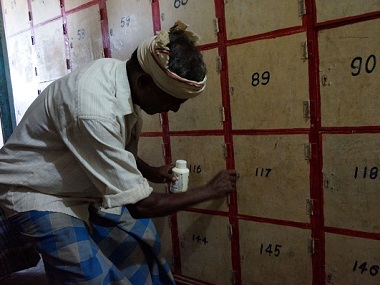By MA Deviah Last Saturday, Karnataka Chief Minister Siddaramaiah announced a comprehensive suicide relief package for farmers in Karnataka. In a nutshell: -Cash compensation increased from Rs one lakh to Rs five lakh -Government will pay for education of the dead man’s children till post-graduation -Children will be covered by insurance and healthcare benefits -Widow’s pension increased from Rs 2,000 a month to Rs 5,000 a month. -In case of the suicide of women farmers, a member of the family will get a pension of Rs 2,000 a month. [caption id=“attachment_2469620” align=“alignleft” width=“380”] At the end of his working day, a farmer puts his pesticide back into a pesticide locker. WHO Facebook page/S Manikandan[/caption] The announcement was decried by his opponents as something that would actually encourage farmer suicides, but Siddaramaiah was just doing what his peers in other Indian states have already done. Andhra Pradesh, Telangana, Maharashtra, and Punjab, to name just a few, already have “suicide packages” in place. Well-meaning they may be, but is this the solution to the problem? And, more importantly, are farmer suicides really the big problem that political parties make it out to be? Every suicide is tragic. It brings darkness to the home and destroys families. With around 1,35,000 Indians taking their own lives in 2013, India has the highest number of suicides in the world. However, when compared to the size of its population, the Indian rate of suicide is just slightly more than Germany, but less than half of China. Nor is the suicide rate among Indian farmers extraordinarily high. According to a 2011 University of Manchester study, reported in The Economist last year, the suicide rate among Indian farmers was just under 30 per 1,00,000. This was lower than the rates among farmers in France and Scotland. It gets even more interesting. Farmers in India are 60 percent of the population, but account for only around 15 percent of all suicides in the country. This means that farmer suicides are less than suicides in other professions! Suicide rates in poorer states like Bihar and UP are lower than states like Gujarat. The five richer states of Maharashtra, Tamil Nadu, Andhra Pradesh, West Bengal, and Karnataka account for around 53 percent of all suicides in India. The other 23 states and seven union territories make up the remaining 47 percent. This suggests that suicide may have little to do with poverty. Other studies have backed this up. An earlier report published in the Lancet says the highest number of suicides in India actually occur among male urban youth aged 15 to 29, not farmers. In fact, the study said, young men in that age group were more likely to die from suicide, than from road accidents! Given the facts, it is likely that this emphasis on farmer suicides has less to do with reality and more to do with politics. Farmers constitute the majority of voters in this country and every party will do its best to woo this constituency, even if it means interpreting statistics differently. This does not mean that the problem of farmer suicides does not exist. It does, but it needs to be addressed from the point of view of prevention. The greatest focus is required on urban youth suicides. Cities do have support systems by way of counselling from professionals, families, and friends; but it is not enough. The government largely ignores the problem here because politicians don’t see how they can convert urban depression into votes. Instead, the focus is on rural areas, which offer fertile grounds to announce populist schemes and take photos with suffering farmers. A major cause of farmer suicide is debt, resulting from failed crops. Rural India is heavily dependent on moneylenders, who tie up farmers in several ways. Moneylenders are involved in all aspects of the farming cycle. Many supply inputs like seeds, fertilisers, and pesticides, payment for which is collected at harvest time. The farmer also borrows money from them for his living expenses, which also must be paid at harvest. By the time harvest comes around, the farmer ends up having to hand over a large part, if not all, of his crop to the moneylender who, and this should not come as a surprise, is also a commodities trader, hoarder, and price manipulator. The government has periodically moved against these ghouls but this only cuts off the farmers’ sources of finances. The dependence on moneylenders could be eliminated by bringing farmers into the banking system. The government’s Jan Dhan Yojna is a good start. Coupled with mobile phone banking, this should empower every farmer to access banking. But, it will be a while before banks start lending money to farmers with no existing credit history. Solutions can come sometimes from the strangest places. Studies have shown that the leading method of suicide is by drinking pesticide. Many farmer suicides are impulsive. Farmers keep pesticide inside their homes, which makes it easy for them to access it during vulnerable moments. The World Health Organisation is funding trials in India, Sri Lanka, and China to test the effectiveness of pesticide lockers. Farmers deposit the pesticide in the lockers, located centrally in the village, taking them out in the morning for use and returning the bottles by night time. More than anything else, suicides have deep-rooted psychological causes. While we address the triggers to suicides, these efforts would be futile if counselling in some form is not made available to rural folk. The government should aim to prevent suicides; relief packages that do not benefit the dead person are not permanent solutions. Whatever the causes, whatever the solutions, politicising suicides is deplorable.
Indian farmer suicide rates are not extraordinarily high. Suicide rates among city youth is much higher than among farmers.
Advertisement
End of Article
Written by FP Archives
see more


)
)
)
)
)
)
)
)
)



